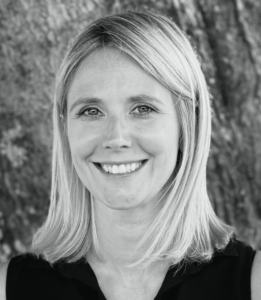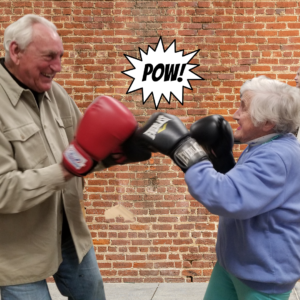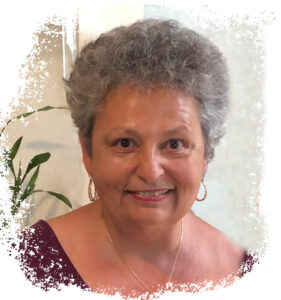 By Renee Lorch, LMFT, Reiki Practitioner
By Renee Lorch, LMFT, Reiki Practitioner
Statistically, those with a diagnosis of Parkinson’s disease are at a 50% risk of developing symptoms of depression and/or anxiety. I have noticed that my clients with PD unknowingly become stuck in cycles of living in the past, trying to stay present, and worrying about the future. I want to break down these cycles to help increase more positive and productive thought patterns.
We all know Parkinson’s disease comes with it’s long list of potential motor and non-motor symptoms. While I am a huge advocate of staying proactive and educated about the disease, there is a fine line between being prepared and becoming anxious. With a diagnosis so full of uncertainty, how do we stay present? I will teach you some tips you can implement to help keep you focused, but it will take motivation, dedication, and practice, practice, practice.
Comparing the Past
“Comparison is the thief of Joy”- Theodore Roosevelt
I see this most often as comparing oneself to a former, younger, healthier version of themselves. My clients often complain about not being able to multitask, get dressed, or move as quicky as they once did and become very critical of themselves. Although these changes are no doubt frustrating, the added pressure and comparison are not productive.
It is important to notice your thoughts when they start to go into the past. Awareness is the first step to improving our thought patterns. Awareness is simply recognizing that the thought is there. When we become aware of our thoughts it allows us to take control over them, instead of allowing them to take control over us!
Instead of beating yourself up about what you can’t do, remember to meet yourself where you are every day! Give yourself Grace. Don’t compare yourself to what you did yesterday, last year, or last decade. MEET YOURSELF WHERE YOU ARE TODAY and learn to MODIFY! If you are having trouble buttoning your shirt consider switching to a shirt that doesn’t require buttoning, or one that has snaps or magnets. Modifying allows you to set yourself up for success. Your ego will tell you to keep fighting with the buttons, your pride will want you to prove to yourself that you can do it! The more tasks you simplify for yourself, the more time and energy you’ll have getting to do the things you want to do!
Worrying about the Future
I am reminded of a quote I once heard, “Once you have met one person with Parkinson’s, you have met ONE person with Parkinson’s”.
The list of potential symptoms that come with PD can be overwhelming. This is where anxiety can get in the way. Thinking ahead and wanting to be prepared is never a bad thing. You want to make sure you are not comparing stories or experiences of others with PD. Although you may share a diagnosis with someone, your journey will be your own! It is important to have a safe place to discuss these fears/worries/concerns. Keeping them inside won’t make the problem go away! If you don’t feel comfortable talking to your family or friends, seeking out support from a professional could help you manage these feelings and improve your confidence as you face new changes and transitions.
When we feel out of control about the outcome (of anything) we jump to conclusions based on things we have read, heard, or seen and apply it to our own experience. Our thoughts can be very powerful and often create stories that we can easily justify as truth. If we don’t watch our thoughts, they can spiral out of control leaving us worried about something that hasn’t even happened yet, or may not ever happen! As mentioned before, becoming mindful of these thoughts is a great first step to changing irrational thought patterns.
Exercises
Learning to keep yourself grounded is an excellent way to help with thoughts that get carried away. Staying present allows us to face the here and now. Comparing the past and worrying about the future can create increased stress. We cannot control the past or the future, so lets focus on the NOW! I am going to show you a few simple exercises you can practice to help keep yourself grounded/present, especially when you notice unproductive thoughts sneaking in.
1. 5 senses exercise: Start with taking a deep breath, and sit comfortably. Use each of your 5 senses to allow yourself to feel present wherever you are.
· Name 5 things you see
· Name 4 things you feel (touch)
· Name 3 things you hear
· Name 2 things you smell
· Name 1 thing you taste (if possible) Click here for a print out: Grounding Exercises (therapistaid.com)
2. Deep breathing: This is excellent for helping you connect to your body. There are many different breathing methods. Here is one you can try:
· Breathe in through the nose for 4 seconds
· Hold for 4 seconds
· Exhale though the mouth for 6 seconds
· Repeat steps for 2-10 minutes Click here for a print out: Deep Breathing (therapistaid.com)
Other beneficial activities:
Count your heartbeat
Laugh
Exercise
Socialize
Puzzles/cards/other games that require focus
Listen to music
Listen to a guided meditation.
_____
Renee Lorch is a Licensed Marriage and Family Therapist and Reiki Practitioner. Renee specializes in working with older adults, particularly those with Parkinson's, Alzheimer's and dementia. Renee also helps facilitate the South Orange County Care Partners Support Group. You can find out more about Renee at ReneeLorchTherapy.com

 emotionally draining. That’s why it’s essential for care partners to carve out time for themselves so they can rejuvenate to avoid burnout. But this shouldn’t be done during class time. As coaches, our mission is to instruct and motivate our PD fight team, in a safe and caring environment, which includes the assistance of care partners. We created a safety training program that outlines care partner (and volunteer) class roles that can apply to any PD exercise program. Highlights include:
emotionally draining. That’s why it’s essential for care partners to carve out time for themselves so they can rejuvenate to avoid burnout. But this shouldn’t be done during class time. As coaches, our mission is to instruct and motivate our PD fight team, in a safe and caring environment, which includes the assistance of care partners. We created a safety training program that outlines care partner (and volunteer) class roles that can apply to any PD exercise program. Highlights include: By Renee Lorch, LMFT, Reiki Practitioner
By Renee Lorch, LMFT, Reiki Practitioner As a young student entering my freshman year with the ultimate goal of becoming a doctor, I never imagined that my first experience with medicine would involve my father. Afghanistan was invaded by Russia in 1979, forcing my family to flee the country. We first escaped to Germany and eventually made our way to the United States. The resettlement had one caveat, the family was forbidden to leave unless one member of the family remained behind as an assurance that the remainder of the family would return. My father remained in Afghanistan while the remainder of his family, my mother, older brother, younger sister and of course myself, fled and settled in Germany. After two painfully long years without our father, he finally was able to escape and join our family in Germany. When looking back, this is when my mother recalls the beginning of declining health changes in my father. The more we reflect, it does seem a majority of these initial subtle signs were ignored and ascribed to stressful life circumstances. Our family found ourselves repeating history. My father remained in Germany while the remainder of his family relocated to Indianapolis, Indiana. After two painfully long years awaiting legal entrance into the United States, my father finally rejoined his family. Upon first encounter with my beloved father, we all knew something had changed. The bright spirit within him had dimmed. He no longer was the life of the party! That sums up my father’s personality in one sentence. His pace became noticeably sluggish. Previously simple tasks became an obvious challenge. He became quiet, reserving his speech for the necessary moments. I recall his apparent change in gait came paired with a newly developed expressionless face. We continued making excuses and attributing these symptoms to his time spent apart from his entire family for almost four years.
As a young student entering my freshman year with the ultimate goal of becoming a doctor, I never imagined that my first experience with medicine would involve my father. Afghanistan was invaded by Russia in 1979, forcing my family to flee the country. We first escaped to Germany and eventually made our way to the United States. The resettlement had one caveat, the family was forbidden to leave unless one member of the family remained behind as an assurance that the remainder of the family would return. My father remained in Afghanistan while the remainder of his family, my mother, older brother, younger sister and of course myself, fled and settled in Germany. After two painfully long years without our father, he finally was able to escape and join our family in Germany. When looking back, this is when my mother recalls the beginning of declining health changes in my father. The more we reflect, it does seem a majority of these initial subtle signs were ignored and ascribed to stressful life circumstances. Our family found ourselves repeating history. My father remained in Germany while the remainder of his family relocated to Indianapolis, Indiana. After two painfully long years awaiting legal entrance into the United States, my father finally rejoined his family. Upon first encounter with my beloved father, we all knew something had changed. The bright spirit within him had dimmed. He no longer was the life of the party! That sums up my father’s personality in one sentence. His pace became noticeably sluggish. Previously simple tasks became an obvious challenge. He became quiet, reserving his speech for the necessary moments. I recall his apparent change in gait came paired with a newly developed expressionless face. We continued making excuses and attributing these symptoms to his time spent apart from his entire family for almost four years.

 movements seem similar to the tightly wrapped artichoke. But artichokes are an exception in the garden. When left unpicked the edible buds open into a spectacular flower.
movements seem similar to the tightly wrapped artichoke. But artichokes are an exception in the garden. When left unpicked the edible buds open into a spectacular flower. by Peter Whyte
by Peter Whyte program because at the same time I was trying desperately to complete an album of my songs. Parkinson’s and I were in a race, me to finish my album and Parkinson’s to throw a monkey wrench into things. I got 11 or my 12 songs finished. The one that didn’t quite get finished was the most important to me though, a song I wrote for my Father.
program because at the same time I was trying desperately to complete an album of my songs. Parkinson’s and I were in a race, me to finish my album and Parkinson’s to throw a monkey wrench into things. I got 11 or my 12 songs finished. The one that didn’t quite get finished was the most important to me though, a song I wrote for my Father. Another thing I loved, but lost because of my voice, was mentoring young adults in the ways and means of entrepreneurship. I called them my ‘Biz Kids.’ Mentoring allowed me to impart the experience and skills I had acquired over 4 decades of business life, and it was a great way to stay dialed in to the ever-moving technology sector where my interest lay. I loved sending a young person back to the streets armed with a new skill, tip or solution to their business problems. Many of those meetings were just me telling them a story, masking a lesson. Music and business building weren’t the only things I lost by letting my vocal capability erode.
Another thing I loved, but lost because of my voice, was mentoring young adults in the ways and means of entrepreneurship. I called them my ‘Biz Kids.’ Mentoring allowed me to impart the experience and skills I had acquired over 4 decades of business life, and it was a great way to stay dialed in to the ever-moving technology sector where my interest lay. I loved sending a young person back to the streets armed with a new skill, tip or solution to their business problems. Many of those meetings were just me telling them a story, masking a lesson. Music and business building weren’t the only things I lost by letting my vocal capability erode. welcomed by its beauty, shade, and peace. I leaned into the tree with an open palm, feeling its striated, dark brown trunk, warm and strong to my touch. Within a few timeless moments I felt assured this was a good place to lay my own roots and that all was well. I felt free to move forward.
welcomed by its beauty, shade, and peace. I leaned into the tree with an open palm, feeling its striated, dark brown trunk, warm and strong to my touch. Within a few timeless moments I felt assured this was a good place to lay my own roots and that all was well. I felt free to move forward.